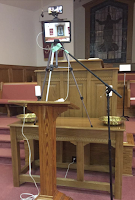New Rostrums (Matt. 13:1-2)
Here are Henry’s words on these two verses:
His [Jesus’] pulpit was a ship not like Ezra's pulpit, that was made for the purpose (Neh. 8:4) but converted to this use for want of a better. No place amiss for such a Preacher, whose presence dignified and consecrated any place: let not those who preach Christ be ashamed, though they have mean and inconvenient places to preach in. Some observe, that the people stood upon dry ground and firm ground, while the Preacher was upon the water in more hazard. Ministers are most exposed to trouble. Here was a true rostrum, a ship pulpit.
Had I not been an eyewitness to the painful struggle my husband experienced in preparing and preaching the gospel in a building otherwise devoid of life, I would not understand the difficulty—really, I still don’t and feel unsure I will ever be able to do so.
Even though I am physically walking through this strange COVID-19 experience with Greg as my daily contact, my human with skin on, I have no clue what it feels like to bear the heavy burden of a shepherd for his sheep, some of which are lost or helpless or ill. He would love nothing more than to pick them up and bring them all home with him to weather the storm together if it were possible.
I have no true understanding of what it is like to be separated from and overwhelmingly desire to care for his sheep in this time of distress. I see evidence of it in his restless desire to help, in his endlessly trying to do something to make this better, in his texting and calling and 6-foot yard and parking lot visits. I see evidence of his desire in his attempts to transfer his attempts to help to others (who don’t always see or receive it with the same urgency he is feeling). I even see it when he attaches his boat to the back of his trailer in the mornings as he leaves for work knowing he will have time afterwards to fish, the irony being that although he now has time to go, he would much rather be with his people.
This preaching of the gospel is not an easy call—it never has been. Pray for those who are herding sheep from a distance, who are trying to feed them and care for their illnesses and help them rest from the anxious cares of this world right now. Their normal is new.
If you would like to listen to his sermon, the link is below. It begins with a prayer that shows the difficulty of what pastors are having to do, and then there are many announcements related to caring for his congregation (skip past 17:20 to hear sermon, which is full of truth and encouragement in this difficult day).


Comments
Post a Comment
Thank you for taking the time to read my blog. If you have concerns or questions, I will do my best to answer them privately. I will publish comments at my discretion publicly if they glorify God.